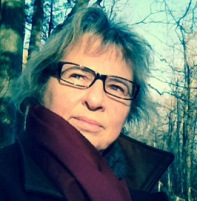
French countryside
Near the picturesque village of Auch in south-west France lies a 100-hectare farm called Naroques. The farm is run by musician-farmer Andy Caro who grows and mills wheat to bake some of the best bread in the region. His ingredient: magic.
Well, not magic magic. But close to it. Good soil.
While visiting Andy, Resurgence & Ecologist journalist Satish Kumar had asked him for the recipe for his exquisitely tasty sourdough bread. Andy responded with: “The secret is good soil. Great food comes from great soil. Our life depends on the few inches of the earth we call topsoil. Here we take good care of the soil, so we get good bread.”
When Satish insisted that there must be something more to his bread then just good soil, Andy offered: “The wheat I grow is not ordinary hybrid wheat, full of gluten and produced with huge amounts of artificial fertiliser and pesticides.” He uses the original or ancient variety that was grown in that area for hundreds of years at least. Unfortunately it is now nearly extinct. Andy searched long for the ancient seeds; they were no longer available and in fact their sale was illegal. But Andy persisted and finally found some in an old grain silo of an old farmer and baker.

Andy on his farm Naroques and Simon making bread
Andy and his colleague Simon supply up to 300 loaves daily to a number of schools and their own shop in Auch. Andy uses horses—not heavy machinery he believes will compact the soil—to sow and harvest his crops. A key to the magic of this bread is that Andy does not plough the land. Instead, he practices pasture cropping: a system in which the farm is covered in perennial pasture; the undisturbed soil continues to improve and its beneficial organisms continue to thrive.

Artisanal sesame bread
“Mess with the soil as little as possible and certainly never turn it upside down,” says Andy.
Magic is never what you expect it to be. In this case magic was achieved through a wonderful partnership of the land, the earth organisms, horses, and humans—all living and working in harmony. The secret of Andy’s bread is indeed magic. And a superb example of farming without chemical fertilizers, pesticides and use of fossil fuel. No pollution was emitted; no waste and emissions of greenhouse gases emitted.
“I have visited a number of organic farms around the world,” writes Satish, “but what Andy is doing is more than organic; it is truly natural farming, totally free of industrial methods of factory farming and agribusiness. If civilization is to survive for a long time, this is the model for healthy, ecological and sustainable ways of food production.”

Artisanal sourdough bread
Andy even has an answer for the sceptics who would challenge this method as being overly idealistic: “There is no lack of food in the world,” he says. “Half of the food in our supermarkets, in restaurants and even in our homes is thrown away. We don’t need more food. We need real food made from strong plants that is both nourishing and nutritious.”
References:
Fukuoka, Masanobu. 2009. “The One-Straw Revolution: An Introduction to Natural Farming.” NYRB Classics. 200pp.
Kumar, Satish. 2019. “Soil: the Magic Ingredient” In: Resurgence & Ecologist, Jan/Feb Issue, 2019.

Nina Munteanu is a Canadian ecologist / limnologist and novelist. She is co-editor of Europa SF and currently teaches writing courses at George Brown College and the University of Toronto. Visit www.ninamunteanu.ca for the latest on her books. Nina’s bilingual “La natura dell’acqua / The Way of Water” was published by Mincione Edizioni in Rome. Her non-fiction book “Water Is…” by Pixl Press(Vancouver) was selected by Margaret Atwood in the New York Times‘Year in Reading’ and was chosen as the 2017 Summer Read by Water Canada. Her novel “A Diary in the Age of Water” will be released by Inanna Publications (Toronto) in 2020.